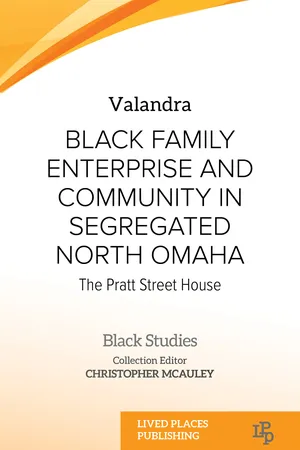
Black Family Enterprise and Community in Segregated North Omaha
The Pratt Street House
- English
- ePUB (mobile friendly)
- Available on iOS & Android
Black Family Enterprise and Community in Segregated North Omaha
The Pratt Street House
About this book
How can one story of a Black family, a community and their relationship to home develop our understanding of lived experience in segregated North Omaha?
In 1952, author and scholar Valandra's grandparents bought a two-story white house on the corner of Pratt Street and 28th Street in North Omaha, migrating from rural Arkansas. Through the sharing of the author's lived experience and intergenerational resident interviews, Black Family Enterprise explores what it was like to grow up in a segregated working-class Black community.
Part oral history, part urban history, part ethnography of a family and community, this first-person account illustrates the common and unique ways residents claim space and place in defining their lives, community, and sustaining their histories, culture, and traditions. These stories of Black urban placemaking address themes of mutual aid, safety, security, structural inequality and injustice.
A series of personal reflections on intergenerational resistance, resilience, and determination, this book is ideal reading for students of Black Studies, African American Studies, Anthropology, Cultural History, Migration Studies, Urban Studies, American Studies, and Social Work.
Frequently asked questions
- Essential is ideal for learners and professionals who enjoy exploring a wide range of subjects. Access the Essential Library with 800,000+ trusted titles and best-sellers across business, personal growth, and the humanities. Includes unlimited reading time and Standard Read Aloud voice.
- Complete: Perfect for advanced learners and researchers needing full, unrestricted access. Unlock 1.4M+ books across hundreds of subjects, including academic and specialized titles. The Complete Plan also includes advanced features like Premium Read Aloud and Research Assistant.
Please note we cannot support devices running on iOS 13 and Android 7 or earlier. Learn more about using the app.
Information
Table of contents
- Cover
- Half Title
- Title Page
- Copyright Page
- Dedication
- Table of Contents
- Learning objectives
- Introduction
- PART I History
- PART II Community pillars
- PART III Neighborhood, inheritance, and legacy
- Conclusion
- Suggested discussion topics
- References
- Further reading
- Index